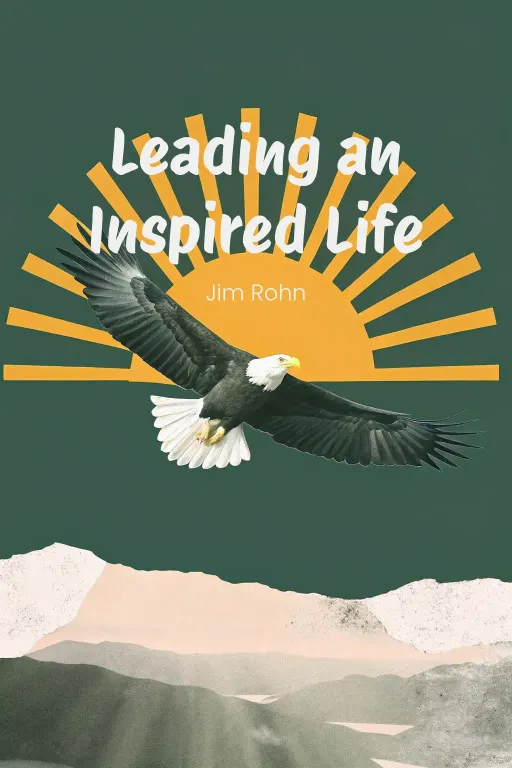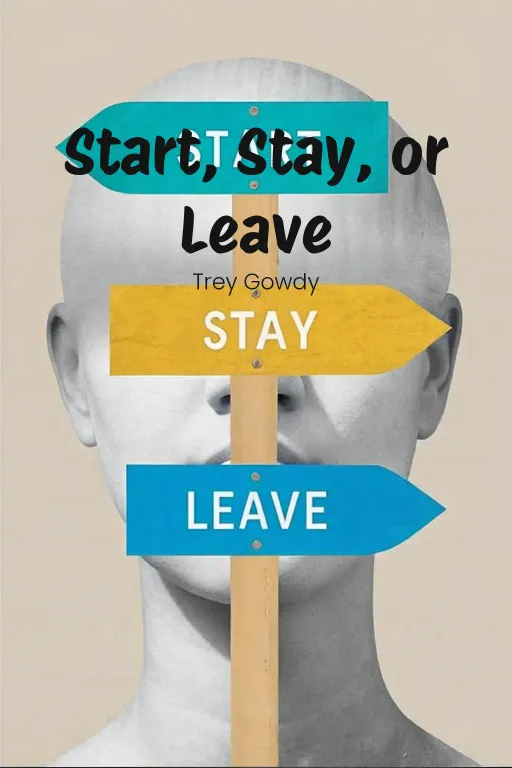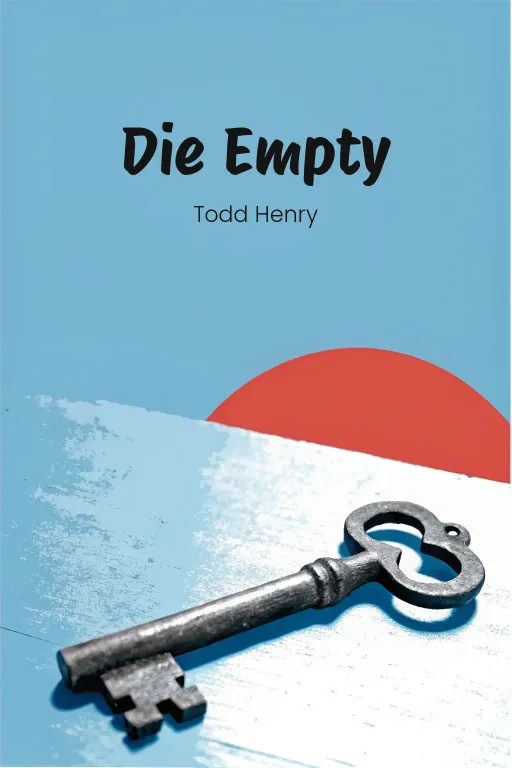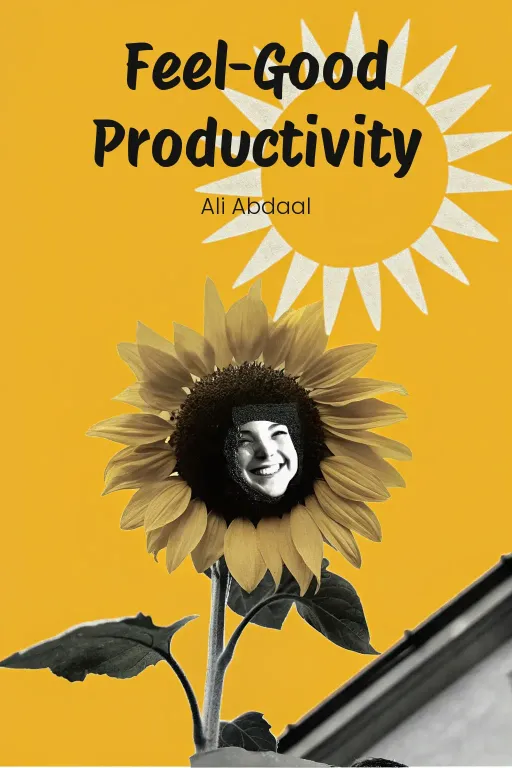
Life's Blueprint: Discipline, Goals, and You
Podcast by Beta You with Alex and Michelle
Timeless Wisdom and Practical Strategies to Find True Fulfillment
Life's Blueprint: Discipline, Goals, and You
Part 1
Alex: Hey everyone, and welcome back! Today we're tackling something truly transformative: Jim Rohn's “Leading an Inspired Life”. If you've ever felt like there's a gap between where you are and where you want to be, trust me, you'll want to hear this. Michelle: Okay, Alex, so is this another one of those, you know, "just visualize success" kind of things, or is there actually something we can sink our teeth into here? Alex: Definitely substance, Michelle. Think of Jim Rohn as like, the OG of self-improvement. He gives you the groundwork, the real strategies. It's not just about pumping you up; it’s about the nitty-gritty of self-discipline, owning your life, and consistently pushing yourself to be better in all aspects. Michelle: Alright, you have my attention. What's the core message here? What are we really aiming for? Alex: The core is simple, that everyone wants to live a life that's more than just existing - it's about feeling truly “inspired”. So, we’re going to break that down into five pillars. First, “discipline”—that's your foundation. Second, “accountability”—owning your actions turns hurdles into stepping stones. Third, “goal-setting”—your GPS in this crazy world. Fourth, “relationships”—because no one succeeds in a vacuum. And fifth, “resilience”—that inner drive that keeps you moving, no matter what. Michelle: So, essentially, we're talking about everything from how you make your bed in the morning to, well, leaving your mark on the world, right? Alex: Precisely! It's not about quick fixes; it's a total shift in how you live, one disciplined choice at a time. Let’s dive in!
Discipline: The Foundation of Success
Part 2
Alex: Alright, let's pick up where we left off and dive right into what I think is the cornerstone of Jim Rohn's philosophy: discipline. It's not just some principle he throws around; it's really the glue that holds everything else together. Without it, ambition is just talk. Michelle: Okay, "discipline is key," got it. But remind me, why did you call it a "bridge" instead of, say, a ladder or even a highway? Alex: That's a great clarifying question. Rohn uses the bridge as a metaphor because of how discipline connects where you are now—your dreams and potential—to where you want to be, which is your tangible outcomes. See, a ladder makes it sound like a quick climb, or a highway might make it seem too easy. But discipline is consistent; it needs effort and consistency to cross, even when you can’t see the other side. It's all about those small wins that add up to real, sustainable results. Michelle: So, no shortcuts then... figures. And, if I know Rohn, he’s got examples lined up, right? Alex: Of course. Think about a salesperson, right? They aim to make ten calls to potential clients a day. Now, skipping one day doesn't feel like the end of the world. But then you skip another, and then whole weeks go by... Momentum's gone, your pipeline dries up, and you're left wondering why you aren’t hitting your targets. Compare that to someone who's disciplined. They hit, or even exceed their target every day. Over time, that person gains more than increased sales, they get confidence, expertise, and a great reputation. That's the power of showing up consistently. Michelle: Okay, consistency is important. But, let's be real here, discipline sounds draining. What do you do on days you just can't find the motivation? Alex: That's where Rohn's insight really shines. He always points out that procrastination is the easiest thing to fall into, but it is also the most damaging. Discipline doesn't have to be a huge effort every day; it can be showing up somehow. Even if you don't perform your best, taking action makes sure you don't lose ground. Essentially, building discipline is about creating habits that feel natural, even automatic. Michelle: I hear you, but isn't there a danger of burnout? How do you know when to ease off instead of pushing harder? Alex: That's a valid point. Rohn's answer is to start small. Little by little trumps being overambitious. Instead of aiming to work out seven days a week, commit to just three. Start with ten minutes, and let your success build on itself. He called it the "ripple effect". Being disciplined in one thing actually influences other parts of your life. Michelle: So, you clean your room, and suddenly you're running marathons and handling your finances like Warren Buffett? Alex: Maybe not so literally, but almost! Rohn always claimed that the discipline we learn while sticking to a small, doable thing like organizing your desk—or even reading just ten pages a day—naturally carries over to bigger things. As you master small habits, you will gain confidence, and that momentum will spread across other areas such as fitness, to finances, to relationships, anything, really. Michelle: But how do you stop from breaking the chain? What about the days when you just want to sleep in all day? Alex: Rohn's tip is just to be more aware. Notice your patterns, and decide to change them. For instance, if you know you're procrastinating or avoiding things, decide to take just one small step forward, no matter how tiny it seems. This disrupts the inertia and keeps you moving. Michelle: Awareness. Got it. Easy to say, harder to do. Did Rohn ever share how he personally cracked the discipline code? Alex: Absolutely. Rohn was the definition of undisciplined until his mid-20s. He found himself broke and frustrated, nowhere near his dreams, despite being ambitious. Then he met his mentor, Earl Shoaff, who taught him one of Rohn’s most important lessons: "For things to change, you have to change." Shoaff wasn't saying external things were to blame. The point was owning your life, and forming habits that get results. Michelle: So, Rohn suddenly changed overnight? Alex: Not at all. He adopted disciplined practices gradually, one by one. He made it a habit to save money consistently, even just a little bit. He educated himself daily, reading books and listening to lectures. He set personal and financial goals and kept track of his progress regularly. These things added up over time; he achieved financial independence, professional success, and, most importantly, a sense of self-worth. Michelle: Okay, that's good - it's not about having superhuman willpower, but making steady, consistent progress. Still, it sounds intense. Does discipline ever become fun? Alex: That's what's great about it, Michelle—it does. Rohn always talked about the rewards, both internal and external. Inwardly, discipline builds self-respect. Every time you keep a promise to yourself, even a small one, you reinforce that you're capable and trustworthy. Outwardly, consistent effort always brings real rewards like financial security through saving, career growth from mastering skills, and health improvements from workouts. Rohn put it this way: "For every disciplined effort, there are multiple rewards." Michelle: Alright, I'm convinced. Start small, stay consistent, track your wins, and you'll see real change. I don't want to make it sound too easy, but this sounds almost foolproof. What's the catch? Alex: No catch, just intent. Discipline isn't glamorous; it involves some inconvenience, sacrifice, and delayed gratification. But the outcome? A life where you're actually living your goals, instead of just thinking about them. As Rohn always said, the future we hope for starts with the disciplined choices we make today.
Personal Development and Responsibility
Part 3
Alex: Okay, so we've talked about discipline. Now, let's dive into how personal development and taking responsibility really shape us. If discipline is the bridge between your dreams and what you actually do, personal development and owning your actions are like making sure that bridge is, you know, solid and can handle everything you're throwing at it. Michelle: Ah, so we're switching from focusing on “walking” across the bridge to “building” it right? Am I right in thinking the most basic part here is taking responsibility for your life? Alex: You nailed it, Michelle. Jim Rohn always said that personal development really kicks in when you stop pointing fingers at everything else – society, bad luck, whatever – and start owning your choices. He had this big moment where he was just feeling stuck, financially and personally, and then he realized, "Hey, the problem isn't out there. It's me." Michelle: Okay, but that's a pretty bold claim. I mean, a “lot” of people feel genuinely stuck because of, well, stuff completely outside their control. How does he respond to that kind of argument? Alex: He isn't saying that external things don't matter, but he kind of flips the script. His mentor, Earl Shoaff, told him, "It’s not what happens to you, it’s what you do about it." It’s that little shift from "Why is this happening to me?" to "Okay, how am I going to handle this?" that puts you back in the driver’s seat. The more you own what you do, the more you actually start to control what happens. Michelle: Alright, but can you give me a concrete example? Because I get the idea in theory, but this could easily sound a little too abstract. Alex: Absolutely. Rohn talks about this young guy who was really struggling financially. Instead of, you know, complaining about not having enough money, he started taking these small steps. He learned budgeting, how to save, and even picked up some skills to make more money. By just consistently working on these things, he went from being broke to being financially secure. It's a classic example of taking responsibility and making real change. Michelle: Okay, so it's not about discovering some secret magic or winning the lottery. It's about putting in the work, step by step. But what if someone has “no” idea where to even begin? Blaming other people almost seems easier because at least it's clear. Alex: That's actually where Rohn's idea of self-awareness comes in. He says the first thing is— and really look at yourself. Figure out what you're good at, what you're bad at, your habits, routines, all of it. Are you using your time effectively? Are you even chasing goals that you really care about? Rohn was a big fan of journaling for this – it helps you turn these fuzzy thoughts into something clear that you can actually “do” something about. Michelle: Journaling, huh? Isn’t that just… you know, writing "Dear Diary" stuff? Alex: Well, it's a bit more structured than that. Think of it as a way to, you know, track your patterns – how you're spending your time, how you react when things get tough, where you tend to mess up. It's not just about writing down what you “did” today, but what you actually “learned”. It's like holding up a mirror to your habits and choices, and over time, it starts to show you where you could improve and grow. Michelle: Alright, Alex, I guess that sounds useful. But, you know, thinking about myself doesn't exactly pay the bills. What's Rohn's next big thing after you've looked inside? Alex: Once you're aware of yourself, then you need to commit to always learning. Rohn argued that the moment you stop learning, you stop growing. Personal development really depends on constantly learning. It could be anything from, you know, going to a seminar to just reading a book or listening to a podcast. Every skill and every bit of knowledge you pick up gives you more leverage for the future. Michelle: Okay, that makes sense. But I'm wondering, how do you stop that from just feeling completely overwhelming? I mean, there's an “infinite” amount to learn, and sometimes you just don't have enough hours. Alex: Rohn deals with this by breaking these big goals into tiny, manageable parts. He says to start with habits that are easy to handle, like reading for 15 minutes every day. That makes the whole process feel less scary. And those little moments of learning really add up over time and become something big. Michelle: So, self-awareness, thinking about yourself, and learning constantly. Let me ask you this. What part does failing play in all this? Because you can prepare as much as you want, and you're still going to screw up. Alex: That's what's so great about his approach—failure isn't the end. It's a chance to learn. Rohn always talked about turning challenges into opportunities for growth instead of seeing them as defeats. He even shared stories about his own career setbacks and how he changed direction after really thinking about what went wrong. It's not about being perfect; it's about taking responsibility for your failures and using them to, you know, adjust what you're doing. Michelle: That feels... human. And honestly, it’s refreshing. A lot of self-help stuff can be kind of perfectionist, like you’re supposed to have it all figured out from day one. Alex: Exactly. Rohn’s whole philosophy is just as much about being kind to yourself as it is about pushing yourself to improve. Like, let's say you want to save a certain amount of money each month, but then you get hit with a big bill that throws you off track. Someone else might just give up, but Rohn would say, "Okay, what can I learn from this?" Maybe you need to build an emergency fund. The point is to focus on improving, not being perfect. Michelle: I like that. And that connects with the person he talks about, right? The father who made a few tiny changes for his family’s future? Alex: Exactly. He didn’t just wake up magically with a better life. He made a conscious decision to take responsibility, find those changes – like budgeting and learning new skills – and stick with them. Every small win, like sticking to his budget for another month, gave him confidence and, you know, pushed him forward. It changed his finances and his whole life. That story shows how taking responsibility can really make your life better in so many ways. Michelle: Alright, Alex, I'm convinced. But back me up here. Self-reflection, learning new things, and reframing failures all sound like things that apply to you as an individual. Does Rohn ever talk about how they work together? Alex: Definitely. He sees these things as all feeding into each other, you know? When you really look at yourself, you figure out what you need to learn. And as you learn and grow, you have more ways to deal with setbacks and failures. And when you get through those tough times, then you become even better at looking at yourself honestly. It's like a positive cycle where each step makes the others stronger. That’s why committing to responsibility and growth is so powerful. Michelle: So, no shortcuts, no blaming luck or other people—just going after it, one step at a time. It sounds daunting, but it also sounds, you know, really empowering. Is there a saying that goes along the lines of: if you wanna a different result, then make different decisions? Alex: Exactly. Personal development is really about owning the choices that make you who you are and shape your future. Rohn’s message is really simple: when you take ownership, you get the power to build the life you really want.
Goal-Setting for Success
Part 4
Alex: So, with self-awareness and responsibility locked in, it's time to translate those into concrete goals, right, Michelle? We're shifting from inner growth – all that mindset work we’ve been digging into – to outward progress. It's about taking that newfound clarity and ownership and turning it into something real. Michelle: Okay, so it's like we're going from “fixing” the engine to “plotting” the course, right? But seriously, Alex, why all the fuss about goal-setting? Can't we just...you know...play it by ear most of the time? Alex: Well, that's where most people stumble, actually. They see goals as optional, a little flourish on the side, instead of the main course. Rohn argues that goals aren't just things to tick off a list; they're more like guiding stars. They give your ambition structure and build momentum. Without them, even the best ideas or talents just end up...directionless. Like trying to sail the ocean without a compass. Michelle: Alright, point taken. But here's my skeptical question: What if you set these "guiding stars," but life throws you a curveball? Doesn't that just make things more frustrating? Alex: That's where clarity is key. Rohn says a "fuzzy future" just doesn't have any pull. If your goals are hazy, they lose their power to keep you motivated when things get tough. So, instead of saying, "I want to be successful," you really nail down what "success" means to you. Is it financial independence? A specific career milestone? More time with family? Clear goals are like a backbone, helping you adapt to challenges without losing your way. Michelle: Okay, but where do you even start? I know vision boards and journaling are having a moment, but isn't it more than just doodling your dreams on a notepad? Alex: Oh, absolutely – it's not about wishful thinking. Rohn emphasizes linking your vision to action. It's not enough to know what you want; you've got to know why you want it, and then map out the steps to get there. Like someone dreaming of leaving their 9-to-5 to start a business. It's not just "I want freedom." The real driver might be spending more time with their kids or creating something lasting. That emotional why fuels you to overcome obstacles and build those essential habits Michelle: Hmmm, so you're connecting motivation to what "really" matters. Makes sense. But even with that emotional connection, isn't it still overwhelming to tackle those huge goals? Like, if someone says, "I want to retire young and travel the world," where do they even begin? Alex: That’s where Rohn is brilliant: he says to break those big goals down into small, doable steps. Think of it like building a house—one brick at a time, instead of trying to conjure the whole thing out of thin air. Take financial independence, for example. Start with the basics: budgeting, saving a consistent percentage of your income, maybe just tracking where your money goes. Those daily habits build momentum. Over time, early retirement becomes more than just a pipe dream. Michelle: So, it’s like compound interest for life – small, consistent actions that eventually lead to something big. Got it. Any specific stories that illustrate this approach? Alex: Definitely. There's this story of a single mother who was determined to send her daughter to an elite private school. The tuition seemed impossible at first, way out of reach. But instead of giving up, she broke it down: cut expenses, took on extra shifts, found side hustles. Each small victory, like saving an extra hundred dollars a month, brought her closer. Eventually, she made it happen – not overnight, but through persistence, chipping away at that overwhelming goal, bit by bit. Michelle: That's amazing. But here's the thing, Alex: not everyone has that kind of willpower. What about those days when you're just too tired or unmotivated to work on your big plan? Alex: That's where Rohn stresses the importance of visual reminders. Keeping your goals visible keeps them alive in your mind. He suggests using vision boards, sticky notes, even just a written action plan you look at every day. Think of it like your to-do list on the fridge. As you cross things off, you see those small wins adding up – just like that mom saving for her daughter’s tuition! Those visual cues keep you on track, even when you're running on fumes. Michelle: I like the crossing-things-off idea. It's tangible, satisfying. But is there a danger of getting too focused on the checklist and losing sight of the real goal? Alex: Good point, Michelle. Tracking progress isn't just about ticking boxes. It's about regularly assessing what's working and what's not. Rohn advocates for accountability systems—journals, performance reviews, even mentors. Entrepreneurs, for example, often use key metrics to track their business’s health. You're not just marking off tasks; you're asking, "Did this actually bring me closer to my outcome?" That keeps you focused on the bigger picture. Michelle: Alright, so we’re setting goals, using visuals to stay motivated, and tracking results. How do you balance those long-term dreams with the daily grind? Isn't it easy to lose sight of what matters while slogging through emails and errands? Alex: That's a huge point, and Rohn would absolutely agree—balancing those things is essential. He suggests setting aside dedicated time for activities that directly support your big goals. Even if your day is packed, block out a half-hour to learn a new skill or network. It's about creating paths towards your dreams within the everyday responsibilities. Rohn warns about getting so caught up in the small stuff that the larger vision fades. Michelle: Makes sense—the "urgent" often drowns out the "important," right? But what about those days when your priorities truly clash? Family, career, personal goals all screaming for attention? Alex: That's where Rohn emphasizes self-awareness and intentionality. He dives deep into the why behind your goals. Family often becomes central to your motivation—like that mom working to secure her daughter's education. Her tough choices, like sacrificing leisure time, were rooted in a clear reason: creating a brighter future for her child. Rohn also says to recognize seasons – there will be times when one area of your life needs more focus than others, and that's fine, as long as it doesn't completely derail your overall vision. Michelle: And speaking of motivations, Rohn's "four motivators" seem to tie directly into this balancing act. Family, recognition, expert respect, and personal growth. I bet each one resonates differently with different people, right? Alex: Exactly. For some, family is the ultimate motivator—like parents making sacrifices for their children. For others, it's peer recognition—proving themselves in their field or team. Then you have expert respect, the desire to earn the admiration of mentors or industry leaders. And finally, there's personal satisfaction, which, for many, is the deepest driver—mastering skills, achieving dreams, becoming the best version of themselves. Rohn believes understanding your motivator is key to harnessing its power. Michelle: So you're saying motivation isn't one-size-fits-all. You need to figure out what drives you and use that to fuel both the big steps and the small ones. Alex: Precisely. Think of the American pioneers Rohn talks about. Their dream of reaching new lands and prosperity wasn't just a fleeting idea – it was clear, vivid, and deeply emotional for them. That clarity and emotional connection gave them the resilience to endure hardships most of us can barely imagine. Their story embodies Rohn's philosophy, showing that a compelling vision rooted in purpose can not only inspire but also sustain action through the toughest challenges. Michelle: And ultimately, this is about more than just achieving goals, right? Rohn's whole concept of legacy seems like the culmination of everything we've been discussing. Alex: Exactly. For Rohn, goals aren't just isolated milestones – they're stepping stones to building a legacy that lives on after you. Whether it's that mom changing her family's future forever or Andrew Carnegie using his wealth to make a philanthropic impact, the deepest satisfaction comes from turning what you achieve into something meaningful for others. It’s about aligning your personal success with the greater good, ensuring your goals aren't just self-serving but create lasting value. Michelle: So goals are as much about the impact they leave as they are about the journey to get there. Alright, Alex, I'm sold – time to rethink my own goals with all this in mind. Thanks!
Relationships and Leadership
Part 5
Alex: You know, Michelle, I think goals really take on a deeper meaning when they're connected to the relationships and leadership roles that are central to our lives. What really drives us to push harder, grow stronger, or just be better versions of ourselves? It’s not just about personal ambition, is it? It's about the relationships we value and the leadership we offer. That's what turns individual success into something much bigger, a shared legacy. Michelle: I see your point, Alex. It definitely shifts the focus from just improving yourself to contributing to something larger. The thought that the people around us, or the people we lead, can amplify our impact is pretty powerful. But, doesn't that add even more pressure? I mean, relationships and leadership aren’t exactly straightforward, are they? Alex: Absolutely! That’s why Rohn treats them as critical themes in “Leading an Inspired Life”. This shifts the focus from personal growth to community and societal impact. Let’s start with relationships, which he sees as the foundation for success, personally and professionally. Rohn stresses the importance of authenticity, empathy, and shared experiences as vital for lasting connections. Michelle: Okay, “authenticity”, sure. Nobody likes a fake. But what exactly do we mean by “empathy” and “shared experiences”? I mean, plenty of relationships sort of just run on autopilot, without much thought, let alone anything profound. Alex: Exactly – and that’s where the difference lies. Exceptional relationships don’t just happen; they’re actively built. Rohn emphasizes going beyond just surface interactions and engaging fully with people. He uses the example of small acts of kindness, like asking "How are you?"—but doing it with genuine intention. For instance, in a workplace setting, you might routinely ask a colleague, “How’s it going?” And then one day, they don't give their usual cheerful response. Instead of just moving on, you pause and say, “Are you sure everything’s okay? You seem a little off.” That little bit of attention could create trust, maybe even friendship. Michelle: So, being warm and consistent—it’s more than just being polite. Got it. But is just being kind really enough to turn a relationship into something exceptional? It's nice, sure, but it seems… basic. Alex: Kindness is definitely the starting point, but there's more to it. Rohn also talks about being sensitive to what people aren’t saying, the emotions and experiences they don't immediately express. It’s about genuinely listening and showing real interest. For example, instead of just hearing someone say, "I'm fine," you ask follow-up questions that encourage them to share more, creating space for a real connection. Michelle: Okay, I’m starting to get it. Let me guess: shared experiences then build on this deeper understanding? Alex: Spot on. Think of shared experiences as the glue that holds relationships together. Like, a mentor and a mentee, instead of the mentor just offering general advice, they share their own earlier struggles, saying, “I’ve been where you are, feeling unsure and overwhelmed. Let me tell you how I dealt with it.” That shared experience builds empathy and relatability, bridging any gaps between different life stages, even generations. Michelle: That makes sense. People connect over similar experiences—they see themselves in your story. But relationships aren't only about deep discussions and bonding, right? What about the people we shouldn’t be investing in? The ones who might drag us down? Alex: Okay, so now we're getting into one of Rohn’s most interesting ideas: analyzing influence. He's direct about it: our social circle really impacts who we become. He famously said, "You are the average of the five people you spend the most time with." If your closest relationships are with people who are complacent or negative, that mindset can rub off, even without you realizing it. And, being around ambitious, supportive people lifts you up. Michelle: A little ruthless, but fair enough. I’ve had friends who, let’s just say, didn’t always encourage the best choices. But does Rohn suggest cutting ties completely? That feels a bit extreme. Alex: Not always, but sometimes, yes. If someone consistently undermines you or brings toxic energy, letting go can be necessary—it’s about protecting your well-being and your goals. He also encourages "upgrading" your circle, finding mentors or collaborators who challenge you and inspire growth. Like, a young entrepreneur might choose to hang out with friends who are always partying, or they could surround themselves with people who are focused on innovation. The choices they make impact their trajectory. Michelle: Sounds like sacrifice is a big part of it. Choosing who you let in—and out—of your life is a bit harsh, but it's strategic. Alright, so relationships shape us. How does all this relate to leadership? Alex: Leadership builds on these ideas directly. Exceptional leaders, according to Rohn, elevate not only themselves but everyone around them. They are intentional and selfless, focusing on collaboration, empowerment, and shared purpose. Basically, leadership is about stepping up for others because of the values you hold. Michelle: Okay, leading isn’t just bossing people around. Still, what makes great leaders stand out from the rest? A fancy title doesn’t guarantee anything. Alex: It comes down to qualities like kindness, humility, and even humor. Kindness shows you care, which builds loyalty. Humility keeps you grounded, which makes it easier to connect with your team and learn from setbacks. And humor? Well, that's the “secret sauce” for morale. Imagine a team with a looming deadline. A manager who can use humor in tense meetings keeps spirits up, which can really revitalize focus. Michelle: So they’re approachable and solution-focused. But leadership’s always messy, right? Situations change. What advice does Rohn have for managing tight deadlines, limited resources, or even conflicts? Alex: One thing he recommends is the 80/20 Rule: identify the 20% of tasks or people that give you 80% of the results, and then invest your resources there. Like, in a sales team, pinpointing the top performers allows leaders to channel their training or incentives to those key individuals. Over time, those small adjustments can create big shifts. Michelle: So it’s about being efficient. But what about the human side of leadership, like hiring well? How do you make sure you bring in the right people? Alex: That’s where Rohn gets systematic. He suggests looking beyond the qualifications on a resume and assessing things like values and adaptability. Imagine you're interviewing two candidates. One is highly skilled technically but doesn't take feedback well. The other has a bit less experience but is eager to learn and work with the team. Rohn would say: hire the one who is eager to learn! You can teach skills, but attitude and adaptability are what really matter. Michelle: Makes sense, Alex. You can fix skill gaps, but bad mindsets… not so much. But Alex, balancing leadership sounds tough—so how do strong leaders manage it all? Alex: Balance, I think, between your personal life and your leadership responsibilities, is critical. Rohn talks about how the two are connected: unresolved problems in one area will definitely affect the other. A leader who is consumed by work or neglectful at home is at risk of burning out or losing credibility. Rohn suggests setting boundaries, taking care of both sides consistently, and leading by example. Michelle: So it’s about leading with competence combined with intentionality. And in the end, leaders make a… legacy? Alex: Precisely. Rohn emphasizes leadership’s ripple effect, like Carnegie, who redirected his wealth to societal good. For Rohn, we don’t remember leaders just for their accomplishments but for how they uplifted others. And that, Michelle, it comes back to relationships. The connections we make keep us grounded, and leadership propels us into a larger impact. Together, they make for an inspired life.
Resilience and Lifelong Growth
Part 6
Alex: So, ultimately, resilience and adaptability are what help us apply all of these principles throughout our lives, no matter what comes our way. This brings us to what is possibly the most transformative aspect of Jim Rohn's thinking: resilience and lifelong growth. It really does tie everything else together – the discipline, the responsibility, nurturing relationships, and leadership – it all depends on this ability to persevere. Michelle: Ah, okay. So, the final point here is that even if you're super disciplined, you're great at goal-setting, and you've got a fantastic network around you, life is still going to throw curveballs. Right? Then it’s your resilience that determines whether you fall apart or come out on top? Alex: Precisely! For Rohn, resilience goes beyond just weathering the storm; it's about actively growing because of it. He wants us to see setbacks not as failures, but as important steps in our personal growth. That 's what his seasonal analogy is all about—there will always be tough winters, but spring always follows. Michelle: Got it, poetic. But practically speaking, what does "embracing the winter" even mean? Most people just try to survive those hard times, they rarely come out stronger than they were before. Alex: Well, a fantastic illustration of this is the story he tells of the frog trapped in a jar of cream, remember that one? The frog is in a seemingly impossible situation, right? No way out. But, instead of quitting, it keeps paddling. Eventually, all that paddling turns the cream into butter, giving him a solid platform to jump to safety. It is such a powerful picture of how persistence can turn the impossible into something manageable. Michelle: So you're saying, the struggle itself isn't the problem - it is actually the raw material for success, as long as you don't give up. Easier said than done, though. How exactly do you keep yourself from just… stopping paddling? Alex: Well, Rohn would say it's about changing how you see failure altogether. He argues it's not about who you are as a person, but rather feedback, you know? It tells you what's not working and where to change course. It means learning from setbacks instead of letting them crush you. For instance, he talks about a writer who kept getting their novel rejected. Instead of getting discouraged, the writer took that feedback, refined their skills, and eventually turned that manuscript into a bestseller. Michelle: Okay, but seeing failure as a learning opportunity – how realistic is that when you're dealing with intense feelings? Let’s say I just bombed a job interview; my first thought is definitely not, "What can I learn from this?" Alex: Totally normal, but that's where Rohn stresses the importance of managing your emotions as a key part of being resilient. He suggests breaking the cycle by changing how you talk to yourself. So instead of saying, "I failed," you say, "Okay, that didn't work, what can I try next?" It's about actively choosing a positive outlook, even when it feels unnatural. Michelle: And once you've reframed the failure, then what? I guess the goal is to come back stronger, but how do you actually make sure you're not repeating the same mistakes? Alex: That's where his practical resilience tools come in. First, figure out what really caused the failure. Rohn advises writing it down. It helps you see things more clearly and keeps your emotions in check. Think of an entrepreneur whose sales are dropping. Instead of blaming everything on the market, they should look at their strategy. Is their marketing weak? Is their product design not good enough? Are they not reaching enough people? Finding the real problem lets them fix it directly. Michelle: So, less about feeling sorry for yourself and more about a quick autopsy to figure out what went wrong. What comes after that? Alex: Turning those negative feelings into motivation. Rohn has this brilliant quote: "Disgust is the beginning of change." It's when you're so fed up with the way things are that you feel driven to do something about it. Say someone is drowning in debt – they could use that frustration to create a strict budget, cut out unnecessary spending, and look for ways to earn more. That disgust becomes the driving force toward a better financial future. Michelle: So, channel that irritation instead of letting it stop you in your tracks. Got it. Now, what if that frustration is building, and you start to lose momentum? Resilience requires a maintenance plan, right? Alex: Absolutely. One of Rohn’s top tips for building and keeping resilience is to encourage yourself. Be your own cheerleader. He suggests celebrating even the smallest victories because each one reinforces your belief in your ability to push through. For example, a runner training for a marathon might celebrate finishing their first five kilometers instead of focusing on the entire 42 kilometers. Those small victories keep momentum alive. Michelle: All right, so we've got self-analysis, emotional redirection, and celebrating milestones. But it seems like resilience also relies on what's going on around you. You can't always do it on your own, can you? Alex: Exactly! Rohn is a firm believer in the power of relationships to strengthen resilience. Having strong support from family, friends, or colleagues offers not only encouragement but also perspective. He even compares it to soldiers in battle. Often, what keeps them going isn't just duty but camaraderie. That shared sense of purpose becomes an emotional anchor. Michelle: And what about when the people around you aren't offering that camaraderie – when they'd rather wallow with you instead of helping you get back on your feet? What do you do then? Alex: Then you tap into creativity – another key part of resilience that Rohn talks about. When nothing else works, creativity can help you see challenges from a different angle. For instance, businesses struggling with traditional models shifted to e-commerce, expanding their reach instead of dwelling on what wasn't working. Creativity, in that sense, doesn't just solve problems, it transforms them. Michelle: That's solid. So, resilience is a combination of persistence, emotional agility, relying on your community, and embracing creativity. Does Rohn ever talk about how this leads to lifelong growth? I mean, the title does include "Lifelong" for a reason. Alex: Definitely. He sees resilience as a springboard to something even bigger: adaptability. Being adaptable means staying curious and open to change. Rohn uses the example of professionals navigating a rapidly changing technological landscape. Instead of resisting, they take the initiative to learn, evolve, and stay relevant. It's about turning resilience into a proactive habit of lifelong growth. Michelle: So, resilience is bouncing back stronger after a setback, and adaptability is staying ahead of the next one. Makes sense. What does Rohn suggest for maintaining that adaptability over the years? Alex: Two things: regular self-assessment and a commitment to lifelong learning. Self-assessment means periodically checking in with yourself to see if your habits and circumstances still align with your long-term goals. Lifelong learning keeps you agile, whether it's upgrading your skills or staying informed about changes in your field. Michelle: This really ties everything together nicely! Resilience isn’t just about “surviving hardship”; it’s about using challenges and failures to drive growth and adaptability. It's kind of the ultimate summary of everything Rohn teaches. Alex: Precisely! Resilience is the energy that fuels discipline, responsibility, relationships, and leadership. It’s what empowers us to turn failures into opportunities, setbacks into comebacks, and challenges into opportunities for growth! It truly becomes the bedrock of a truly inspired life.
Conclusion
Part 7
Alex: Okay, Michelle, time to bring it home. Today we talked about the core ingredients of “Leading an Inspired Life”. We're talking about discipline as the bedrock – it’s really the how you actually get from dreaming to doing. Then there's responsibility. It's about ditching the blame game and owning your decisions. And, of course, having crystal-clear goals. Goals act like our personal GPS, you know? Then you gotta fuel up with motivation that actually matters to “you”. And finally, we can't forget about the importance of relationships and leadership, it's more like success isn't a solo act; it’s about who you connect with and lift up along the way. And Resilience, that's what ties it all, together, it helps you to bounce back, learn, and keep growing. Michelle: That's a lot to unpack, Alex. But what really resonates with me is this: Rohn isn’t selling some get-rich-quick scheme or a magic motivation pill. His genius is showing us how those little, consistent actions snowball into something huge. It's about showing up, knowing where you're going, and not letting the stumbles define the whole journey. Alex: Precisely. The real "aha!" moment is realizing that transforming your life starts with tiny promises. Take a good look at your current status, figure out where you’re trying to be, and begin small by building those habits. Like Rohn always said, "Success is just a few simple disciplines, practiced every day.” Michelle: Right, so, action time. What’s one, concrete step Rohn would tell us to take “right now”? Alex: Journaling. Seriously. Start like, super small – five minutes, tops. Just jot down what you did, what you learned, and how you can tweak it for tomorrow. It's surprisingly powerful; it can really spark off an inspired life. Michelle: Alright, you’ve swayed me. Journaling it is. So, everyone, whether you're chasing a huge, long-term goal or just trying to clear that first hurdle, remember: Progress doesn’t need to be perfect, just persistent. Let’s make those daily disciplines count! Alex: Exactly! Thanks for hanging out with us today, everyone. Here's to designing your own inspired life. Catch you next time!









